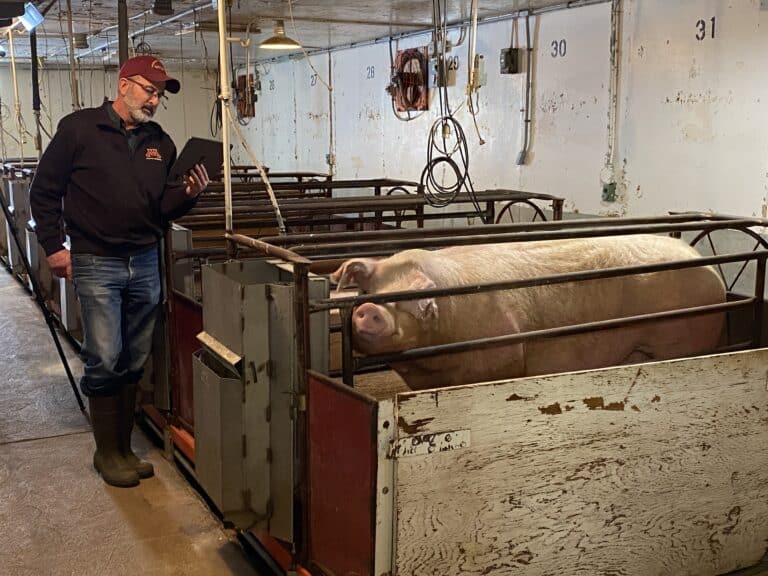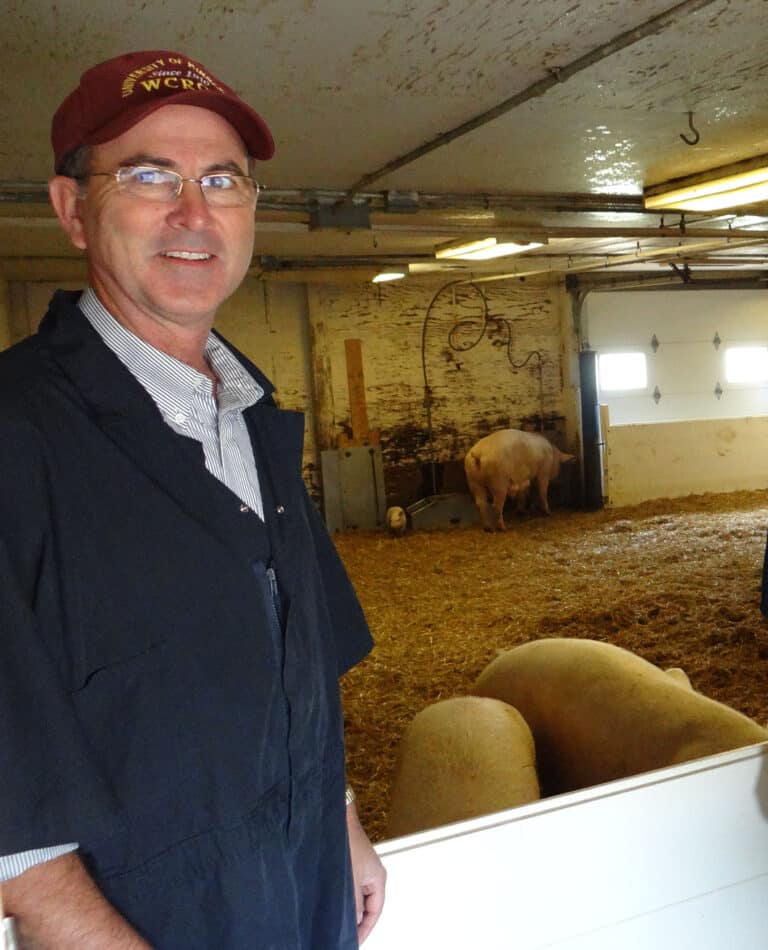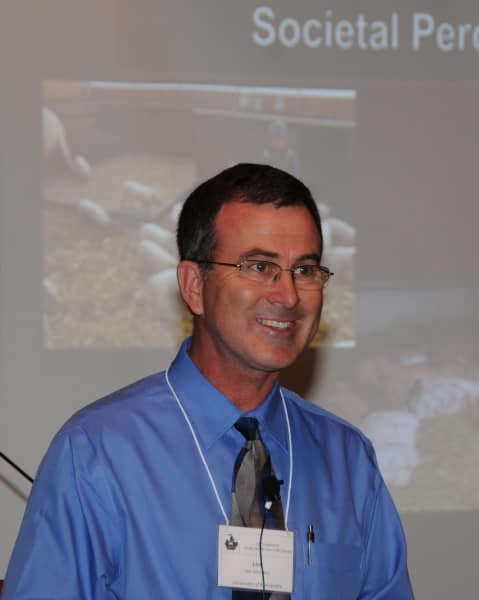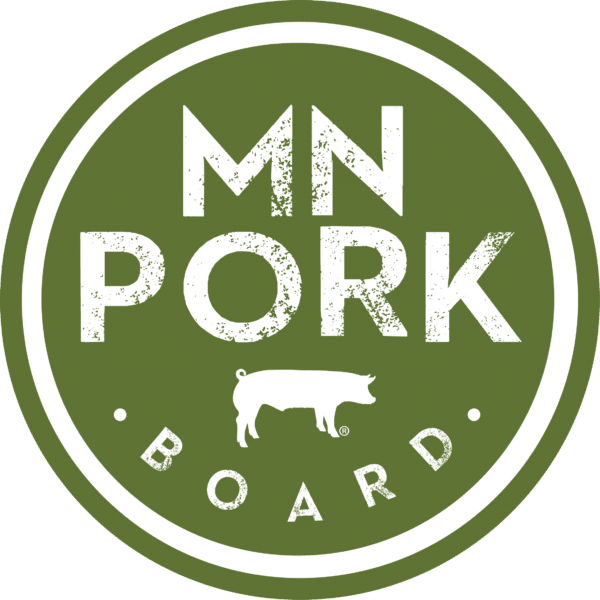Each award is highlighted in the 2025 Minnesota Pork Congress magazine. Read the full magazine here.
The Minnesota Pork Board recognizes Lee Johnston as this year’s Distinguished Service award recipient.
The Minnesota Pork Board recognizes Lee Johnston as this year’s Distinguished Service award recipient.

Lee Johnston’s unwavering commitment to agriculture, advancing research, and mentoring future leaders has earned him the Minnesota Pork Distinguished Service Award. His journey from a dairy farm in Pennsylvania to becoming a respected expert in the pork industry highlights a career marked by curiosity, commitment, and passion.
The Distinguished Service Award honors individuals who have made significant contributions to the pork industry in Minnesota. Johnston’s decades of impactful work as a researcher, professor, and mentor at the University of Minnesota (UMN) West Central Research and Outreach Center (WCROC) have shaped not only the pork industry but also the lives of those who have learned from him.
From dairy to pigs: A journey to leadership
Johnston grew up on a ninth-generation dairy farm in western Pennsylvania. While his early life revolved around milking cows and managing farm chores, one part of the routine stood out to him.
“I liked everything about the farm—I just didn’t like milking,” Johnston said.
While pursuing his bachelor’s degree in animal production at Pennsylvania State University (Penn State), Johnston learned the university hired students to work on its research farms. He then submitted applications to work at the dairy, beef, and swine barns.
“I put my application in, and it just so happened that Vern Hazlett at the swine barn called and said he had a position,” Johnston said. “He told me it would be 17 hours a week and asked if I was interested.”
Although he had no pig experience, Johnston was eager to get started.
“I interviewed, and there was another guy that applied who didn’t have any pig experience, either,” Johnston said. “So, Vern said he’d hire us both but split the hours and see which one of us works out. He hired Bob Bortz and I, and we ended up staying three years working in the pig barn at Penn State.”
The experience was profound and marked the start of Johnston’s lifelong involvement in the pork industry.
“That was really the launching of the whole pig thing,” Johnston said. “I judged on the livestock team and got to see genetic advancements on pig farms. It was exciting, and I didn’t want to milk cows, so the pig thing seemed like the right career path.”
His family’s farm was a Revolutionary War-era land grant, originally spanning more than 300 acres before shrinking to 40 acres as the town expanded. These deep agricultural roots reinforced Johnston’s commitment to farming, even as he pivoted from dairy to pigs.
While approaching graduation from Penn State in 1982, Johnston recalled the pig industry had limited jobs available amidst low prices. Although he did not anticipate moving west of the Mississippi River, or obtaining additional degrees, he took an opportunity to work as an assistant manager at Texas Tech University’s Swine Research Unit in Lubbock, Texas. While there, he earned a master’s in swine nutrition in 1984.
Johnston’s academic journey continued at Michigan State University, where he obtained a Ph.D. in swine nutrition and management in 1988. During his time there, Johnston worked as an assistant state swine extension specialist, contributing to extension programs including barrow shows and carcass evaluations. This role expanded his experience and understanding of various industry activities.
Each step of Johnston’s education was guided by mentors such as Hazlett, Dr. Don Orr, Dr. Elwyn Miller, and Dr. Maynard Hogberg, helping him build connections that shaped his career. When his time at Michigan State was coming to a close, Johnston decided he wanted to stay in academia for at least the early part of his career.
“It’s easier to go from academia to industry, it’s more of a challenge to go from industry back into academia,” Johnston said.
In 1988, Johnston and his wife, Judy, moved to Morris, Minnesota, where he began his position at the WCROC as assistant professor.
“It was the only academic position available at the time, and we thought, ‘We’re young, we don’t have kids yet, and if it doesn’t work out, we can move.’ That was 36 years ago,” he said.
By 1998, ten years after Johnston started, he achieved the rank of full professor. In 2010, he was promoted to director of the WCROC, a position he held until late 2022.

Innovative research grounded in science
Throughout his career, Johnston has focused on research addressing producers’ needs through practical solutions. He has conducted impactful research spanning a wide range of topics, including sow housing, carbon footprints and solar-powered barns, and reproductive management in sows. Early on, he was part of the first academic team to study feeding distillers grains to pigs.
Johnston noted how these projects did not always produce groundbreaking results for the industry, but still yielded valuable insights.
“Not everything we try works, but that’s equally important to know,” Johnston said. “Knowing what doesn’t work can save time and resources for producers.”
Johnston’s evidence-driven approach has earned him a reputation as a trusted resource. Long-time colleagues of Johnston’s can testify to the lasting impact he has made on the pork industry, both nationally and internationally. Dr. Bob Thaler, South Dakota State University extension swine specialist and distinguished professor, recalled Johnston’s contributions.
“Lee has spent his career working directly with producers to first determine what their main challenges are, and then to design research trials to provide science-based, unbiased answers to those problems,” Dr. Thaler said. “While it’s not very ‘sexy’, he is the only person I know that has done work on sow constipation and its effects on sow performance because that was a big issue plaguing the industry in the late 1990s.”
Johnston’s colleague at UMN’s College of Veterinary Medicine, Montserrat Torremorell, DVM, Ph.D. and professor and department chair, highlighted Johnston’s impacts.
“Lee’s research is applied, relevant and impactful. He consistently delivers thorough studies with rigorous experimental design, analysis and interpretation of results,” Torremorell said. “Producers can always count on Lee’s results to be presented in an unbiased way. Through his research, Lee has also trained many graduate students who have also contributed to the dissemination of knowledge to swine producers.”
John Anderson, a pig, cattle, and crop farmer from Belgrade, Minnesota, reflected on his over 30-year collaboration with Johnston at Anderson Farms.
“As farms like ours expanded and moved our production inside, Lee and the WCROC would hold many events to give guidance in many aspects of production,” Anderson said. “We were breeding for a more prolific sow and Lee responded by helping formulate diets to meet her needs. As the feed ingredients changed everything from synthetic amino acids to distillers, Lee would supply unbiased research to help us make informed decisions.”

Respect earned by doing
Johnston’s academic contributions include over 140 journal articles, six book chapters, numerous extension publications, and articles in popular press. He has been a keynote speaker over 50 times both nationally and internationally.
He has been a leader delivering national pork quality assurance, helping ensure those in the industry across the state are educated in proper animal handling and knowledge.
His career has also spanned some of the pork industry’s most challenging periods. During the COVID-19 pandemic, he helped producers manage mass euthanasia events and supply chain disruptions. He also worked collaboratively to elevate agricultural literacy among the public.
“Farmers were hurting—not just financially, but emotionally,” Johnston said. “We worked to provide support. We had calls on Sunday afternoons to discuss what we could do to help.”
Working alongside colleagues at the UMN’s Andrew Boss Laboratory of Meat Science, the team learned that inexperienced individuals were obtaining pigs from farmers forced to euthanize animals during the pandemic plant closures. In response, the team developed educational resources, including a YouTube series on small-scale pork processing as part of broader efforts to engage non-agriculture audiences.
“The genesis of this work was about bridging understanding,” Johnston said. “We wanted to explain why these challenges were happening during the pandemic shutdowns and how they could be addressed.”
Johnston’s list of professional accomplishments is impressive. His awards include multiple recognitions for innovation in outreach from the National Pork Board, the Outstanding Faculty Award from the UMN Animal Science Graduate Club in 2003 and 2008, the Distinguished Alumnus Award in 2014 from the Penn State Department of Animal Science, and, most recently, the Outstanding Extension Faculty Award at the UMN Extension Dean’s Distinguished Banquet in 2023.
However, his impact extends beyond these accolades. Johnston’s work in the pork industry is shaped by his unwavering integrity and commitment to providing honest, fact-supported guidance.
“What I appreciate the most about Lee is that he is a man of character and principle,” Dr. Thaler said. “He tells people not what they want to hear, but what they need to hear, and it’s supported by hard science.”

Mentorship and integrity
For Johnston, the most rewarding aspect of his work has always been mentoring and guiding students.
“Graduate students are one of the reasons I’m still in this role after all these years,” he said. “I can tell you where every one of them is, what they’re doing, and the impact they’re making in the industry.”
One example of this lasting connection is Jeffery S. Knott, Ph.D., owner of Ideal Animal Nutrition, LLC, who first met Johnston when he began graduate school in 1999. Now collaborating on swine research trials, Knott described the impact Johnston has had on his career.
“Lee has taught hundreds of students critical thinking, principles of swine nutrition and management, and the scientific method in a very challenging yet caring way,” Knott said. “Best of all, Lee is a very caring person and helps people succeed. He finds the best in people and is a very positive role model.”
Johnston’s dedication to his students goes beyond teaching, as he often learns from them as well. He shared a light-hearted story that illustrates how the next generation thinks and communicates, particularly when it comes to texting.
“I text using proper grammar, and one day my students told me they thought I was upset because I put periods at the end of my sentences,” Johnston said with a smile. “They still laugh about it to this day.”
Johnston advises the younger generation to remain open-minded and receptive to diverse opportunities. Internships and varied experiences are invaluable, not only for discovering what one wants to pursue, but also for identifying what is not the right fit. With two children of his own, Johnston understands this first-hand.
Johnston also emphasizes the importance of personal and professional integrity. Quoting mentors who shaped his career, he recalls being told:
“You never know who is going to become your boss, so treat people right and fairly. Your professional reputation follows you everywhere.”
These lessons align with a core value in the pork industry of doing the right thing, even when no one is watching.
A well-earned recognition
Receiving the Minnesota Pork Distinguished Service Award is deeply significant for Johnston.
“The recognition of colleagues in the industry is important. Being in a camp with past award winners I respect is meaningful,” he said. “It’s rewarding to know people thought you did something worthwhile.”
Outside of his professional work, Johnston enjoys caring for his Dorset ewe flock alongside his wife, Judy, while also mentoring the young people who show the animals. Together, they raised two children, Justin and Natalie, who are each making their mark in agriculture. The couple now takes pride in being grandparents to four boys.
Johnston’s journey, from his first job in the Penn State swine research barn to becoming a leader in the field, reflects the value of mentorship, collaboration, and his unwavering commitment to agriculture. His influence on Minnesota’s pork industry will resonate for generations.
